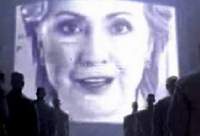Video comparing Hillary Clinton to Big Brother receives over million views in two days
It is guerrilla politics at its cleverest. The mysterious Internet video that compares U.S. presidential hopeful Sen. Hillary Rodham Clinton to Big Brother is the boffo hit of the YouTube Web site.

The 74-second clip, a copy of a 1984 Apple ad for its Macintosh computer, has recorded more than 1 million views, with an enormous surge in the past two days.
While the video's final image reads "BarackObama.com," the campaign of the Illinois senator has denied being behind it.
Its creator remained anonymous.
But for political strategists, ad experts, even journalists, the ad presents a series of other fundamental unknowns.
- How will Web content outside the control of campaigns affect voters?
- How should campaigns react to anonymous but highly viewed attacks?
- When is Web content, no matter how provocative, newsworthy?
As the Internet looks more and more like an electronic community, politicians are increasingly devoting resources to their Web sites, planting themselves in electronic gathering places such as Facebook.com and MySpace.com and posting their videos on YouTube, the AP reports.
With some exceptions, however, what draws viewers is content that politicians do not control. A video clip of former Sen. John Edwards combing his hair to the dubbed-in tune of "I Feel Pretty" has drawn more than 150,000 views. A clip of Clinton singing a slightly off-key version of the Star-Spangled Banner has drawn more than 1 million views.
What's more, Internet content does not have to meet the strict reporting standards that television and radio ads must observe. That makes the Web the medium of choice for stealthy tactics by partisans operating outside the campaigns.
For candidates caught in the crosshairs, one way to respond is to brush it off, preferably with humor.
Asked about the Macintosh video on Tuesday, Clinton said: "I'm just happy if it's taking attention away from my singing. My singing was bad enough. I'm just happy that nobody is tuning in to that."
The ad portrays Clinton on a huge television screen addressing robotic humans in a stark, futuristic hall. A female athlete tosses a hammer at the screen, destroying Clinton's image with an explosive flash. Then this text: "On January 14th the Democratic primary will begin. And you will see why 2008 isn't going to be like '1984."'
But the Web is also a vast repository for imitation. A video posted two days ago copies the same Macintosh ad used against Clinton to target Obama. In a juxtaposition of spoof on spoof, the video uses Obama's pre-Super Bowl TV appearance when he pretended to announce his candidacy only to proclaim his support for the Chicago Bears. "The Bears lost. So will Obama," the ad script says.
Obama, appearing on CNN's "Larry King Live" Monday night, said his campaign knew nothing about the origins of the anti-Clinton ad.
"Frankly, given what it looks like, we don't have the technical capacity to create something like this," he said. "It's pretty extraordinary."
Evan Tracey, chief operating officer at TNSMI/Campaign Media Analysis Group, a company that tracks political advertising, said a television ad watched by 500,000 viewers could be worth up to $1 million (EUR 750,000). "It depends on whether it's 500,000 in New York or the same number of people in Paducah."
But, he added: "The disclaimer is that it's 500,000 people on YouTube, which means that they are generally young and they're not all in Iowa or New Hampshire, which is what matters."
David Winston, a Republican political consultant, said candidates are still grappling with the comparative effectiveness of television advertising and Internet ads, no matter who creates them, the AP said.
"A view on regular media would be what I would describe as a passive view - you're just sitting there being entertained," he said. "A view on YouTube is an intentional view. You actually sought out the content to watch it.
"One of the things we don't understand yet is the difference between our retention based on intentional views versus a passive view."
Finally, the impact of the ad on the audience matters. Keith Appell, a strategist for conservative causes, argued that the Clinton clip might resonate even more with conservatives that with Obama supporters.
"Conservatives really do see her as a potential Big Brother ... not sure Democrats do," he said. "For many of us the picture that capsulizes the Clinton presidency is not him pointing his finger and denying sex with Monica Lewinsky. It's the picture of the armed troops pointing guns at a petrified 6-year-old Elian Gonzalez during that Gestapo-type raid."
Subscribe to Pravda.Ru Telegram channel, Facebook, RSS!


